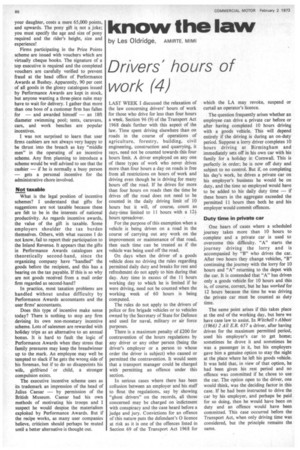know the law
Page 88

If you've noticed an error in this article please click here to report it so we can fix it.
by Les Oldridge, AMIRTE, MIMI
Drivers' hours of work (4)
LAST WEEK I discussed the relaxation of the law concerning drivers' hours of work for those who drive for less than four hours a week. Section 96 (9) of the Transport Act 1968 deals further with this aspect of the law. Time spent driving elsewhere than on roads in the course of operations of agriculture, forestry, building, civil engineering, construction and quarrying, it says, need not be counted towards this four hours limit. A driver employed on any one of these types of work who never drives more than four hours a day on roads is free from all restrictions on hours of work and driving even though he is driving for many hours off the road. If he drives for more than four hours on roads then the time he drives off the road does not need to be counted in the daily driving limit of 10 hours but it will, of course, count as duty-time limited to 11 hours with a hours spreadover.
For the purpose of this exemption when a vehicle is being driven on a road in the course of carrying out any work on the improvement or maintenance of that road, then such time can be treated as if the vehicle was being used off the road.
On days when the driver of a goods vehicle does no driving the rules regarding permitted daily duty and breaks for rest and refreshment do not apply to him during that day. Any time in excess of the 11 hours working day to which he is limited if he were driving, need not be counted when the working week of 60 hours is being computed.
The rules do not apply to the drivers of police or fire brigade vehicles or to vehicles owned by the Secretary of State for Defence and used for naval, military or air force purposes.
There is a maximum penalty of £200 for contravention of the hours regulations by any driver or any other person (being the driver's employer or a person to whose order the driver is subject) who caused or permitted the contravention. It would seem that a transport manager could be charged with permitting an offence under this section.
In serious cases where there has been collusion between an employer and his staff to flout the regulations, say by showing "ghost drivers" on the records, all those concerned may be charged on indictment with conspiracy and the case heard before a judge and jury. Convictions for an offence of this nature puts the defendant's 0 licence at risk as it is one of the offences listed in Section 69 of the Transport Act 1968 for which the LA may revoke, suspend or curtail an operator's licence.
The question frequently arises whether an employee can drive a private car before or after having completed 10 hours driving with a goods vehicle. This will depend entirely if the driving is during an on-duty period. Suppose a lorry driver completes 10 hours driving at Birmingham and immediately sets off in his own car with his family for a holiday in Cornwall. This is perfectly in order; he is now off duty and subject to no control. But if, on completing his day's work, he drives a private car on his employer's business he would be on duty, and the time so employed would have to be added to his daily duty time — if these hours in the aggregate exceeded the permitted 11 hours then both he and his employer would commit offences.
Duty time in private car One hears of cases where a scheduled journey takes more than 10 hours to complete and a private car is used to overcome this difficulty. "A" starts the journey driving the lorry and is accompanied by "B" who drives the car. After two hours they change vehicles, "B" continuing the journey with the lorry for 10 hours and "A" returning to the depot with the car. It is contended that "A" has driven only a goods vehicle for 10 hours and this is, of course, correct, but he has worked for 12 hours because the time he was driving the private car must be counted as duty time.
The same point arises if this takes place at the end of the working day, but here we have case law to assist. In Witchell v Abbott (1%6) 2 All E.R. 657 a driver, after having driven for the maximum permitted period, used his employer's car to get home; sometimes he drove it and sometimes he was a passenger in it, but his employers gave him a genuine option to stay the night at the place where he left his goods vehicle. It was held that, in view of that option, he had been given his rest period and no offence was committed if he chose to use the car. The option open to the driver, one would think, was the deciding factor in this case. If he had been instructed to drive the car by his employer, and perhaps be paid for so doing, then he would have been on duty and an offence would have been committed. This case occurred before the Transport Act, when only driving time was considered, but the principle remains the same.
















































































































































